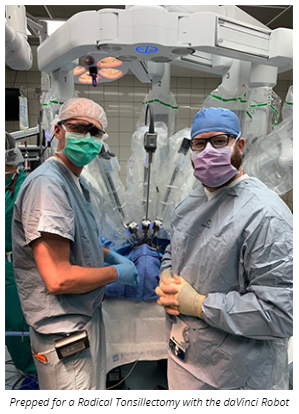How Otolaryngologists Use Technology to Manage Difficult Cases
How Otolaryngologists Use Technology to Manage Difficult Cases
Blog Article
Exploring the Area of Otolaryngology: What to Anticipate When You Speak With an ENT
Otolaryngology, commonly referred to as ENT, includes the medical diagnosis and treatment of nose, throat, and ear conditions. For those experiencing related concerns, getting in touch with an ENT specialist can offer quality and relief. Understanding what to expect during such examinations is crucial for effective interaction and care. This summary will detail vital facets of the ENT experience, including typical factors for sees and the procedures associated with medical diagnosis and treatment.

Recognizing Otolaryngology: An Overview
Otolaryngology, commonly referred to as ENT (Ear, Nose, and Throat) medicine, is a specialized branch of medication that concentrates on the diagnosis and therapy of problems impacting these vital locations of the human body. This field encompasses a vast range of conditions, including those pertaining to hearing, balance, breathing feature, and speech. Otolaryngologists are trained to handle both medical and medical treatments, utilizing innovative strategies and innovations. Their competence extends past typical disorders, dealing with concerns such as allergic reactions, sinus infections, and hearing loss. In addition, they play a critical duty in the monitoring of head and neck cancers cells, supplying comprehensive care customized to individual patient demands. In general, otolaryngology continues to be vital for keeping health and top quality of life in afflicted individuals.
Common Factors to See an ENT Expert
Many people look for the competence of an ENT professional for a selection of factors, showing the varied nature of problems that impact the ear, nose, and throat. Typical issues include persistent sinus problems, which often causes relentless nasal congestion and facial discomfort. Allergies and their associated symptoms, such as itching and sneezing, additionally prompt visits to these specialists (Otorrinolaringologia). Hearing loss, whether unexpected or progressive, is one more substantial reason for consultation. Furthermore, people may seek assessment for throat problems, including persistent hoarseness or ingesting problems. Rest apnea, characterized by disturbed breathing during rest, is frequently resolved by ENT professionals. Each of these conditions highlights the significance of specialized treatment in managing intricate ENT-related wellness problems
Preparing for Your ENT Consultation
When preparing for an ENT appointment, it is crucial to collect relevant info and consider any kind of certain issues. Clients ought to assemble a comprehensive medical history, consisting of previous ear, nose, or throat problems, surgical procedures, and existing medicines. Recording signs and symptoms-- such as duration, regularity, and severity-- can supply valuable insights for the ENT professional. Furthermore, individuals must prepare a checklist of questions they desire to ask, making sure that all problems are addressed during the visit. Bringing along any type of pertinent medical records or examination outcomes can better aid the ENT in understanding the client's condition. Clients should validate their visit information, consisting of place, time, and day, to reduce any kind of final complication. Correct prep work can improve the effectiveness of the consultation and cause better end results.
What to Anticipate Throughout the Appointment
As the assessment starts, the individual can anticipate to participate in a complete conversation with the ENT expert about their signs and clinical history. The specialist will certainly ask about the period, frequency, and severity of signs and symptoms such as hearing loss, nasal congestion, or sore throat. Additionally, the person's previous clinical conditions, drugs, and any appropriate family history will be assessed, assisting the professional in forming a complete understanding of the patient's health. The ENT might also inquire about way of life aspects, such as exposure to allergens or toxic irritants. This open dialogue develops a structure for the appointment, ensuring that the person's worries are addressed and setting the stage for any essential analyses or recommendations for treatment.
Analysis Tests and Procedures in Otolaryngology
A variety of diagnostic tests and treatments are crucial in otolaryngology to accurately review and identify problems impacting the nose, throat, and ear. Typical examinations consist of audiometry, which gauges hearing function, and tympanometry, evaluating middle ear pressure. Nasal endoscopy enables visualization of the nasal flows and sinuses, while laryngoscopy examines the throat and vocal cords. Imaging techniques, such as CT scans and MRIs, give in-depth views of head and neck frameworks. Allergy screening may additionally be performed to identify triggers for sinus or breathing problems. These analysis devices make it possible for ENT specialists to create a thorough understanding of patients' problems, guaranteeing customized and effective management plans. Proper medical diagnosis is essential for effective treatment results in otolaryngology.
Treatment Alternatives Provided by ENT Specialists
ENT specialists supply a variety of therapy choices tailored to address certain conditions affecting the throat, ear, and nose. These therapies range from conventional approaches, such as drug and way of living adjustments, to even more intrusive treatments. Allergic reactions may be taken care of with antihistamines or immunotherapy, while chronic sinus problems might call for nasal corticosteroids or sinus surgery. For hearing loss, ENT professionals commonly recommend listening device or surgical interventions like cochlear implants. In instances of throat disorders, alternatives can include speech therapy or surgeries to get rid of blockages. In addition, they may give assistance for taking care of rest apnea, including the usage of CPAP gadgets or medical interventions. Overall, the goal is to enhance people' lifestyle with personalized care and efficient therapy methods.
When to Look For Follow-Up Treatment With an ENT
Acknowledging when to seek follow-up treatment with an ENT specialist is vital for handling continuous symptoms or complications related to throat, ear, and nose problems. Patients should think about arranging a follow-up visit if signs persist in spite of initial treatment, such as persistent ear pain, nasal congestion, or throat discomfort. Modifications in hearing, equilibrium problems, or uncommon nasal discharge may also warrant additional analysis. Furthermore, if a client experiences side effects from prescribed medications or has actually undertaken a procedure, follow-up treatment is necessary to keep an eye on recovery and address any worries. Timely appointments can guarantee reliable monitoring of conditions, prevent potential complications, and offer peace of mind concerning one's health and wellness. Seeking follow-up treatment promotes proactive health monitoring in otolaryngology.
Frequently Asked Inquiries

What Credentials Should I Look for in an ENT Expert?
When looking for an ENT professional, one ought to search for board accreditation, relevant experience, and solid person testimonials. Additionally, effective communication abilities and a compassionate approach can more info considerably boost the general treatment experience.
Exactly how Do I Choose the Right ENT for My Requirements?
Choosing the right ENT expert includes examining their certifications, experience, and individual testimonials (ENT Clinic). It is vital to ponder their communication design and strategy to treatment, guaranteeing they align with the person's particular health needs and preferences
Are There Any Threats Connected With ENT Procedures?
The risks connected with ENT procedures might include infection, blood loss, anesthetic issues, and possible damages to surrounding structures. People need to review these risks with their doctor to recognize individual concerns and warranty notified decisions.
Just How Can I Manage Anxiousness Before My ENT Appointment?
To manage stress and anxiety before a visit, individuals can exercise deep breathing workouts, visualize positive results, prepare concerns in breakthrough, and look for support from good friends or household, fostering a sense of reassurance and peace.
What Should I Do if I Experience Side Impacts From Therapy?
If side effects from treatment take place, the person needs to without delay report them to their doctor. Changes to therapy or additional treatments might be required to ensure safety and security and effectiveness in managing their condition - ENT. As the assessment begins, the individual can anticipate to engage in a complete conversation with the ENT specialist about their signs and medical background. These diagnostic tools enable ENT professionals to develop a detailed understanding of clients' conditions, making sure customized and effective administration strategies. ENT professionals supply a selection of therapy options customized to resolve specific problems affecting the nose, ear, and throat. When looking for an ENT expert, one ought to look for board accreditation, pertinent experience, and strong patient reviews. Choosing the best ENT specialist entails assessing their credentials, experience, and client testimonials
Report this page